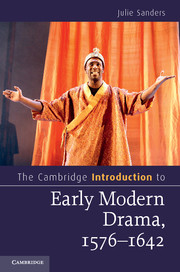Book contents
- Frontmatter
- Dedication
- Contents
- List of illustrations
- Preface: an outline of approaches taken
- Acknowledgements
- List of abbreviations and editions
- Introduction: Brick, lime, sand, plaster over lath and ‘new oaken boards’: the early modern playhouse
- Case study A Richard III at the Globe
- Case study B An outdoor theatre repertoire: the Rose on Bankside
- Chapter 1 Tragedy
- Case study C Opening scenes
- Case study D Staging violence and the space of the stage
- Chapter 2 Revenge drama
- Case study E ‘Here, in the Friars’: the second Blackfriars indoor playhouse
- Case study F The social life of things: skulls on the stage
- Chapter 3 Histories
- Case study G Title pages and plays in print
- Chapter 4 Comedy, pastoral and romantic
- Case study H The boy actor: body, costume and disguise
- Chapter 5 City comedies
- Case study I The dramaturgy of scenes
- Case study J Collaborative writing or the literary workshop
- Chapter 6 Satire
- Case study K Topical theatre and 1605–6: ‘Remember, remember the fifth of November’
- Case study L ‘Little eyases’: the children's companies and repertoire
- Chapter 7 Tragicomedy
- Case study M The visual rhetoric of dumb show
- Conclusion: The wind and the rain: the wider landscape of early modern performance
- Chronology
- Notes
- Bibliography
- Index
- Cambridge Introductions to . . .
Introduction: Brick, lime, sand, plaster over lath and ‘new oaken boards’: the early modern playhouse
Published online by Cambridge University Press: 05 June 2014
- Frontmatter
- Dedication
- Contents
- List of illustrations
- Preface: an outline of approaches taken
- Acknowledgements
- List of abbreviations and editions
- Introduction: Brick, lime, sand, plaster over lath and ‘new oaken boards’: the early modern playhouse
- Case study A Richard III at the Globe
- Case study B An outdoor theatre repertoire: the Rose on Bankside
- Chapter 1 Tragedy
- Case study C Opening scenes
- Case study D Staging violence and the space of the stage
- Chapter 2 Revenge drama
- Case study E ‘Here, in the Friars’: the second Blackfriars indoor playhouse
- Case study F The social life of things: skulls on the stage
- Chapter 3 Histories
- Case study G Title pages and plays in print
- Chapter 4 Comedy, pastoral and romantic
- Case study H The boy actor: body, costume and disguise
- Chapter 5 City comedies
- Case study I The dramaturgy of scenes
- Case study J Collaborative writing or the literary workshop
- Chapter 6 Satire
- Case study K Topical theatre and 1605–6: ‘Remember, remember the fifth of November’
- Case study L ‘Little eyases’: the children's companies and repertoire
- Chapter 7 Tragicomedy
- Case study M The visual rhetoric of dumb show
- Conclusion: The wind and the rain: the wider landscape of early modern performance
- Chronology
- Notes
- Bibliography
- Index
- Cambridge Introductions to . . .
Summary
Writing retrospectively in his three-volume Itinerary (1617) of what he had seen with his own eyes during extensive travels across Britain and Europe in the late sixteenth and early seventeenth centuries, Fynes Morison commented that: ‘There be, in my opinion, more plays in London than in all parts of the world I have seen…’. It is the task in part of this Introduction to explain why and how by 1617 this was the case. Why had London become the epicentre of an unparalleled theatre industry, with a raft of purpose-built playhouses, competing companies, and playwrights of the stature of William Shakespeare, Christopher Marlowe, Ben Jonson and Thomas Middleton vying for business from spectators and the publishing houses alike? What made this such an exciting moment of discovery and experimentation, one in which acting styles, the reach of dramatic language, notions of genre, ways of writing and working, and ideas about what might physically and intellectually be achieved on a stage, were stretched almost to breaking point?
From the outset, it must be made clear that the early modern professional theatre with which this study largely concerns itself did not appear fully formed from nowhere. There were much longer traditions and legacies of playing and performance on which early modern theatre was founded and to which it constantly referred and alluded. Janette Dillon has written that
When audiences saw [the star actor Edward] Alleyn wear a false nose to play Barabas in The Jew of Malta (c. 1589–90), they were seeing a continuity with medieval devils; when Barabas fell into a cauldron of his own devising they were seeing a continuity with the medieval hellmouth; when the Porter in Macbeth (1605–6) came to open the stage-doors in response to the knocking on them, making a stream of jokes about being a ‘devil-porter’ opening the gates of Hell to sinners, they knew they were being asked to recall the harrowing of Hell plays from the mystery cycles; and when Volpone (1606) opened with an image of Volpone surrounded by heaps of gold, they recognised not only Marlowe's Barabas at the start of The Jew of Malta, but also the numerous allegorical images of Goods, Money or Covetousness in early moral plays like Everyman (c. 1510–19?) or in later ones such as All for Money (c. 1572–7).
- Type
- Chapter
- Information
- Publisher: Cambridge University PressPrint publication year: 2014



